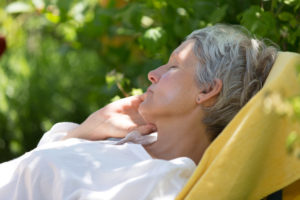By John M. de Castro, Ph.D.
“Studies have shown that sleeping habits improve dramatically when participants where taught to respond to sleep disturbance with mindfulness skills- rather than reacting automatically by increasing effort to rest. After meditating regularly, the average time it took participants to fall asleep dropped from an hour and a half to only 15 minutes.” – IPNOS
It is estimated that over half of Americans sleep too little due to stress. As a result, people today sleep 20% less than they did 100 years ago. Not having a good night’s sleep has adverse effects upon the individual’s health, well-being, and happiness. Yet over 70 million Americans suffer from disorders of sleep and about half of these have a chronic disorder. It has been estimated that about 4% of Americans revert to sleeping pills. But, these do not always produce high quality sleep and can have problematic side effects.
Unfortunately. as we age it becomes more and more difficult to get that good night’s sleep. Although the need for sleep doesn’t change with age sleep patterns change. Older people have a more difficult time falling asleep and staying asleep, waking up several times during the night, and waking early in the morning. In addition, there is less deep sleep, so we don’t feel as rested. Insomnia is much higher in older adults affecting as many as 44%. A safe and effective means for improving sleep in the elderly is important for the health and wellbeing of this vulnerable population. Mindfulness-based practices have been reported to improve sleep amount and quality. There is a need, however, to further study the impact of mindfulness training on sleep in older individuals.
In today’s Research News article “A Secondary Analysis of Sleep Quality Changes in Older Adults From a Randomized Trial of an MBSR Program.” (See summary below or view the full text of the study at: https://www.ncbi.nlm.nih.gov/pmc/articles/PMC5874181/ ), Gallegos and colleagues recruited older adults over 65 years of age and randomly assigned them to receive either an 8-week, once a week, 2 hour session of Mindfulness-Based Stress Reduction (MBSR) or be assigned to a wait-list control condition. MBSR consists of a combination of meditation, yoga, and body scan practice in combination with discussion and home practice. The participants were measured before and after training and 6-months later for sleep quality.
They found that compared to baseline and the wait-list controls, the MBSR participants had significantly improved sleep quality that was maintained for 6 months following completion of training. The effectiveness of MBSR was amplified in participants who had sleep disturbance and was even greater in participants who had insomnia. Hence, the MBSR program improved sleep in the elderly, with the greater the sleep problem the greater the improvement. These are interesting and important results. Sleep disturbance in the elderly is common and is associated with health problems. So, improving sleep quality in this group may well lead to improvements in overall health and longevity.
So, improve sleep quality in older adults with mindfulness.
“When I first started using mindfulness to get sleep, I believed I needed to be meditating at bedtime if I wanted to cure my insomnia. I was completely wrong! I learned that my worries about sleep were happening all day long. I started using mindfulness during the day to notice those worries and learn to accept that I may not get as much sleep as I hope for each night.” – Mary Sauer
CMCS – Center for Mindfulness and Contemplative Studies
This and other Contemplative Studies posts are also available on Google+ https://plus.google.com/106784388191201299496/posts and on Twitter @MindfulResearch
Study Summary
Gallegos, A. M., Moynihan, J., & Pigeon, W. R. (2016). A Secondary Analysis of Sleep Quality Changes in Older Adults From a Randomized Trial of an MBSR Program. Journal of Applied Gerontology : The Official Journal of the Southern Gerontological Society, 733464816663553. Advance online publication. http://doi.org/10.1177/0733464816663553
Abstract
This secondary analysis examined changes in sleep quality associated with participation in a Mindfulness-Based Stress Reduction (MBSR) program among healthy older adults. Data were collected at baseline, 8-weeks post-treatment, and a 6-month follow-up from adults aged ≥ 65 (N = 200), randomly assigned to MBSR or a waitlist control. Group differences were examined using mixed analysis of covariance with repeated measures on the total Pittsburgh Sleep Quality Index (PSQI) score. A small-sized, significant effect was found on overall sleep among MBSR participants with baseline PSQI scores > 5, indicative of a sleep disturbance, F(2, 80) = 4.32, p = .02, η2P=.05. A medium-sized, significant effect was found for MBSR participants with baseline PSQI scores ≥ 10, F(2, 28) = 3.13, p = .04, η2P=.10. These findings indicate that improved sleep quality for older adults who have higher levels of sleep disturbance may be associated with participation in MBSR.
